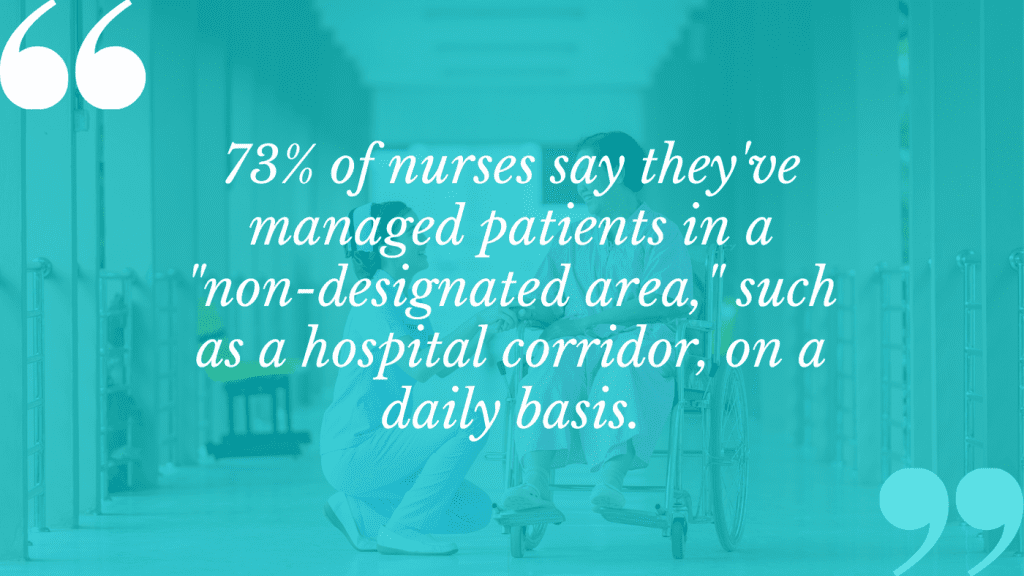‘Corridor nursing’ unfair to patients and staff
February 26, 2020
You may have seen reports recently that patients are increasingly spending hours on hospital corridors waiting for a bed. The numbers regarding the term “corridor nursing” are staggering. Seven in ten nurses say they’re having to treat patients in undesignated treatment areas on a daily basis.
The issue
Some reports (one from a survey of the Royal College of Nursing [RCN] members) show that the actual figure is higher. Moreover, the tendency to admit patients under corridor care (or completely unsuitable locations) environments is standard rather than abnormal
In fact, 73% of the nurses (including A&E nurses) say they’ve managed patients in a “non-designated area” daily. Such areas include corridors, often due to issues such as bed shortages in A&E units.
In addition, 90% fear patient safety is at risk due to such practices. Thinking deeper, such areas, in turn, mean patients are in areas that lack medical equipment or call bells.

What we think of corridor nursing
We would argue that such conditions increase the chance of patients suffering from medical negligence. Patients stuck in waiting in corridors for a bed have a higher chance of dying as well.
This is not acceptable and unfair to patients. Moreover, it’s also deeply unfair on the health professionals and staff working in these hospitals.
Above all, The Medical Negligence Experts are in place to support patients. Namely, we help them receive compensation when they suffer physically, mentally and financially due to medical negligence. However, we’re not blind to staff issues when it comes to matters like:
- Heavy amounts of pressure.
- Truly unrealistic delivery expectations.
- Poor working environments they work in.
This is increasingly becoming the reality that medical professionals work under in recent years. Because even nurses and extra hospital staff know that it is inadequate to treat patients in corridors. With this level of pressure, nursing staff and doctors face a greater risk of burn out as well.
With burn out, what follows is a stream of workplace frustration and compassion fatigue. In short, emergency care can suffer, with care for patients waiting on services found wanting. Plus, a health service struggling to rebuild and expand, and emergency departments without beds open this winter.
What this means to the future
As such, we can envisage a future where medical professionals subject to medical negligence investigations take action against employers.
Perhaps even the Government will require they work in poor working conditions. Conditions, in fact, where they need to attend to an overwhelming number of patients. This, in turn, may cause patients to make a mistake or deliver treatment that falls below the acceptable standard. They, in turn, become susceptible to allegations of medical negligence.
Earlier, we spoke of a supposed two-tier social care system is looking ever likely due to under-funding. In turn, this means that the level of bed-blocking (and no extra hospital beds) within NHS hospitals starts to rise.
For this article, we highlight research on life expectancy differences for those in the UK’s least and most deprived areas. The BBC then reported new figures showing this difference in life expectancy. Other factors show dependency upon where you live in the country, as well as your gender, are starting to further deepen.
Professional healthcare reactions
“This survey shows that having to deliver care in crowded corridors is becoming increasingly the norm for NHS nursing staff.” So says Mike Adams, the RCN’s director for England. “The reasons for the increased pressure on A&E departments are many and well-known.
- Too few staff;
- Not enough beds to admit patients to, and;
- A lack of social care affecting hospitals’ ability to discharge patients quickly enough.
Additionally, there’s a new report from the Chartered Society of Physiotherapists (CSP) and the Royal College of Occupational Therapists. It displays rehabilitation struggles for those post-heart attack, -stroke or ongoing therapy for multiple sclerosis (MS). In short, they tend to face a postcode lottery that can significantly affect their recovery and quality of life.
The Guardian refers to the reactions Simon Stevens, the chief executive of NHS England, thusly:
Stevens last year (2019) urged hospital bosses not to reduce their bed stock any further. (All) to ensure they still had the capacity for when they got very busy.
Clearly then, healthcare in this country needs to improve. some estimates suggest that beyond extra hospital beds, England’s A&Es need as many as 50,000 more nurses as well.
Regardless of the next move, we strongly encourage the Government to think big. Above all, look at its healthcare policies to implement positive changes ASAP.
How we can help
To be clear, we sympathise with the NHS hospital staff that work in poor conditions against unreasonable expectations. Yet instances of medical negligence (especially when it comes to corridor nursing negligence) isn’t acceptable. It’s simply not something we can shrug off as some sort of work reality or norm.
Moreover, when they happen, victims deserve compensation for the physical, emotional and financial harm they endure.
At The Medical Negligence Experts, we and the specialist law firms we work have experience with these matters. We know how to handle instances of medical negligence. So we’re ready to help you receive the maximum amount of compensation possible if you suffered negligent medical care.
We’re here if you or a family member have been a victim of medical negligence. Contact us using either the form or by calling 0161 413 8761.
